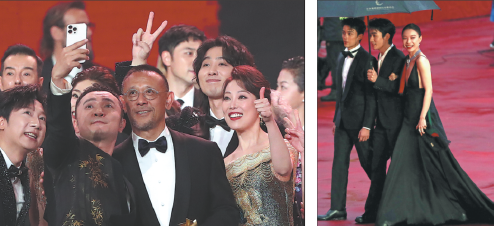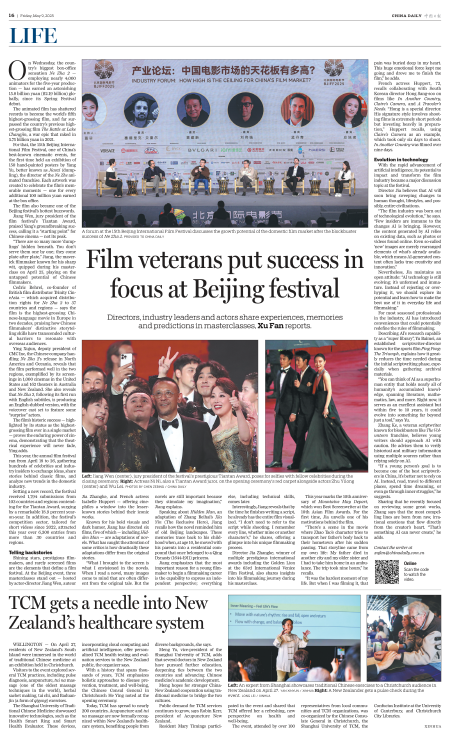
A forum at the 15th Beijing International Film Festival discusses the growth potential of the domestic film market after the blockbuster success of Ne Zha 2.

Left: Jiang Wen (center), jury president of the festival's prestigious Tiantan Award, poses for selfies with fellow celebrities during the closing ceremony. Right: Actress Ni Ni, also a Tiantan Award juror, on the opening ceremony's red carpet alongside actors Zhu Yilong (center) and Wu Lei.

Online Scan the code to watch the video.
On Wednesday, the country's biggest box-office sensation Ne Zha 2 — employing nearly 4,000 animators for the five-year production — has earned an astonishing 15.8 billion yuan ($2.19 billion) globally, since its Spring Festival debut.
The animated film has shattered records to become the world's fifth highest-grossing film, and far surpassed the country's previous highest-grossing film The Battle at Lake Changjin, a war epic that raked in 5.75 billion yuan in 2021.
For that, the 15th Beijing International Film Festival, one of China's best-known cinematic events, for the first time held an exhibition of 150 hand-painted posters by Yang Yu, better known as Jiaozi (dumpling), the director of the Ne Zhe animated franchise. Each artwork was created to celebrate the film's memorable moments — one for every additional 100 million yuan earned at the box office.
The film also became one of the Beijing festival's hottest buzzwords.
Jiang Wen, jury president of the film festival's Tiantan Award, praised Yang's groundbreaking success, calling it a "starting point" for Chinese cinema — not its peak.
"There are so many more 'dumplings' hidden beneath. You don't serve them one by one; they come plate after plate," Jiang, the maverick filmmaker known for his sharp wit, quipped during his masterclass on April 25, playing on the untapped potential of Chinese filmmakers.
Cedric Behrel, co-founder of British film distributor Trinity CineAsia — which acquired distribution rights for Ne Zha 2 to 37 countries and regions — says the film is the highest-grossing Chinese-language movie in Europe in two decades, praising how Chinese filmmakers' distinctive storytelling skills have transcended cultural barriers to resonate with overseas audiences.
Ying Xujun, deputy president of CMC Inc, the Chinese company handling Ne Zha 2's release in North America and Oceania, reveals that the film performed well in the two regions, exemplified by its screenings in 1,000 cinemas in the United States and 162 theaters in Australia and New Zealand. She also reveals that Ne Zha 2, following its first run with English subtitles, is producing an English-dubbed version, with the voiceover cast set to feature some "surprise" actors.
The film's historic success — highlighted by its status as the highest-grossing film ever in a single market — proves the enduring power of cinema, demonstrating that the theatrical experience will never fade, Ying adds.
This year, the annual film festival ran from April 18 to 26, gathering hundreds of celebrities and industry insiders to exchange ideas, share stories behind classic films, and analyze new trends in the domestic industry.
Setting a new record, the festival received 1,794 submissions from 103 countries and regions contending for the Tiantan Award, surging by a remarkable 18.9 percent year-on-year. In addition, the festival's competition sector, tailored for short videos since 2022, attracted this year over 6,300 entries from more than 30 countries and regions.
Telling backstories
Shining stars, prestigious filmmakers, and rarely screened films are the elements that define a film festival. At the Beijing event, three masterclasses stand out — hosted by actor-director Jiang Wen, auteur Jia Zhangke, and French actress Isabelle Huppert — offering cinephiles a window into the lesser-known stories behind their iconic works.
Known for his bold visuals and dark humor, Jiang has directed six films, five of which — including Hidden Man — are adaptations of novels. What has caught the attention of some critics is how drastically these adaptations differ from the original stories.
"What I brought to the screen is what I envisioned in the novels. When I read a novel, many images come to mind that are often different from the original tale. But the novels are still important because they stimulate my imagination," Jiang explains.
Speaking about Hidden Man, an adaptation of Zhang Beihai's Xia Yin (The Reclusive Hero), Jiang recalls how the novel reminded him of old Beijing landscapes. These memories trace back to his childhood when, at age 10, he moved with his parents into a residential compound that once belonged to a Qing Dynasty (1644-1911) princess.
Jiang emphasizes that the most important reason for a young filmmaker to begin a filmmaking career is the capability to express an independent perspective; everything else, including technical skills, comes later.
Interestingly, Jiang reveals that by the time he finishes writing a script, he already has the entire film visualized. "I don't need to refer to the script while shooting. I remember every line, whether mine or another character's," he shares, offering a glimpse into his unique filmmaking process.
Director Jia Zhangke, winner of multiple prestigious international awards including the Golden Lion at the 63rd International Venice Film Festival, also shares insights into his filmmaking journey during his masterclass.
This year marks the 10th anniversary of Mountains May Depart, which won Best Screenwriter at the 10th Asian Film Awards. For the first time, Jia unveils one of his motivations behind the film.
"There's a scene in the movie where Zhao Tao's character tries to transport her father's body back to their hometown after his sudden passing. That storyline came from my own life: My father died in another city and my older sister and I had to take him home in an ambulance. The trip took nine hours," he recalls.
"It was the hardest moment of my life. But when I was filming it, that pain was buried deep in my heart. This huge emotional force kept me going and drove me to finish the film," he adds.
French actress Huppert, 72, recalls collaborating with South Korean director Hong Sang-soo on films like In Another Country, Claire's Camera, and A Traveler's Needs. "Hong is a special director. His signature style involves shooting films in extremely short periods but investing heavily in preparation," Huppert recalls, using Claire's Camera as an example, which took only six days to shoot. In Another Country was filmed over nine days.
Evolution in technology
With the rapid advancement of artificial intelligence, its potential to impact and transform the film industry became a major discussion topic at the festival.
Director Jia believes that AI will soon bring sweeping changes to human thought, lifestyles, and possibly, entire civilizations.
"The film industry was born out of technological evolution," he says. "Few insiders are immune to the changes AI is bringing. However, the content generated by AI relies on existing data, such as photos or videos found online. Even so-called 'new' images are merely rearranged elements of what's already available, which means AI-generated content often lacks true creativity and innovation."
Nevertheless, Jia maintains an open attitude: "AI technology is still evolving; it's unformed and immature. Instead of rejecting or overhyping it, we should explore its potential and learn how to make the best use of it in everyday life and filmmaking."
For most seasoned professionals in the industry, AI has introduced conveniences that could potentially redefine the rules of filmmaking.
Describing AI's research capability as a "super library", Yu Baimei, an established scriptwriter-director known for the sports film Ping Pong: The Triumph, explains how it greatly reduces the time needed during the initial scriptwriting phase, especially when gathering archival materials.
"You can think of AI as a superhuman entity that holds nearly all of humanity's accumulated knowledge, spanning literature, mathematics, law, and more. Right now, it serves as an excellent assistant but within five to 10 years, it could evolve into something far beyond just a tool," says Yu.
Zhang Ke, a veteran scriptwriter known for blockbusters like The Volunteers franchise, believes young writers should approach AI with caution. He advises them to verify historical and military information using multiple sources rather than relying solely on AI.
"If a young person's goal is to become one of the best scriptwriters in China, it's better not to rely on AI. Instead, read, travel to different places, spend time dreaming, or even go through inner struggles," he suggests.
Sharing that he recently focused on reviewing some great works, Zhang says that the most compelling lines are born from raw, irrational emotions that flow directly from the creator's heart. "That's something AI can never create," he adds.
Contact the writer at xufan@chinadaily.com.cn

